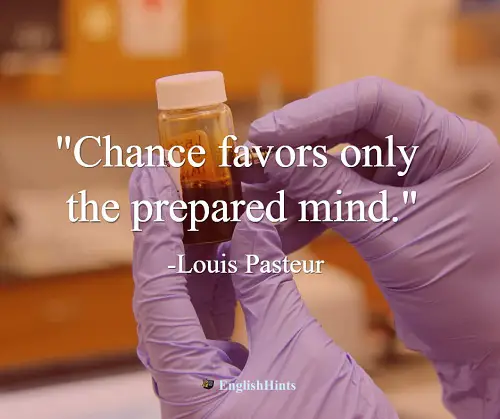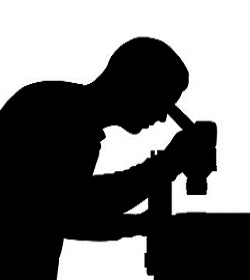The Most Important Science Discoveries and Inventions
There have been many major, world-changing inventions and science discoveries. Which ones do YOU think were the most important?
Both scientific discoveries and inventions often start from accidental or chance observations. (Consider Newton’s apple that started him thinking about gravity, as well as Fleming’s contaminated bacterial cultures that led to the discovery of penicillin.)
Many people observe unusual things, but not so many realize the meaning and importance of what they see. Those are the people who have made progress possible.
This page starts with links to three articles on how science discoveries have happened (and continue to happen). Then there is some vocabulary to review and a classification exercise and questions to practice with these words and ideas.

What Leads to Scientific Discoveries?
Scientific discoveries have often resulted when several factors have come together: Chance or luck, an inquiring mind with the experience or creativity to recognize how that chance discovery might be useful – and often the help or resources of others—a collaboration.
In 1854 Louis Pasteur pointed out, “In the fields of observation chance favors only the prepared mind.” (This has also been translated “Fortune favors the prepared mind.”) As the developer of the germ theory of disease, Pasteur was an authority on the process.
Sometimes the stories we know of brilliant or heroic discoverers leave out some people who had a crucial role in making it possible.
A well-known example is the discovery of penicillin by Sir Alexander Fleming. Other researchers and lab workers played essential roles in making it a history-changing advance rather than just an interesting observation. PBS reviews the whole story here.
Mental Floss has a list of 24 quick (and funny) case studies on discoveries and inventions that happened when chance or accident met a prepared mind. You can watch it as a 10-minute video or read the written transcript.
Finally, this short article points out the value of international collaboration and multicultural points of view for continuing scientific progress.
Science Discovery Vocabulary
An accident is something (often unwanted) that happens unexpectedly, such as falling, dropping something, or crashing a car into something.
An antibiotic is a substance that kills bacteria.
An approach is the way someone attempts to solve a problem. To approach something is to go toward it.
Bacteria are one-celled organisms. Some can cause dangerous diseases like tuberculosis.
A chemist is a person who studies the properties of different substances (chemicals).
To collaborate is to work together with a team of colleagues-- collaborators. Collaboration is the process of working together, especially to solve a problem.
To create is to make something new.
An infection happens when disease-causing bacteria or other microorganisms multiply in a person’s body and cause illness. Infectious is an adjective meaning ‘to cause infection.’ The verb is ‘to infect.’
A laboratory (or lab) is a place where scientists can perform their experiments.
Mold (in this case) is a type of fungus, a primitive form of plant life without green leaves. (A mold can also be a container used to shape a flexible material like jello or clay, and the verb ‘to mold’ means to give something form or shape.)
Penicillin is an antibiotic made from a mold.
A Few Great Science Discoveries and Inventions

Here is a list of some of the great discoveries and inventions that have changed history. (There are many others-- maybe even more important. This list is just a sample. Also, several of these include related discoveries or inventions.)
- the discovery of fire
- the invention of farming (planting seeds, then caring for and harvesting the crops)
- the invention of the wheel
- the invention of sails and sailing ships
- the invention of gunpowder
- the invention of writing
- the invention of paper
- the invention of printing
- the discovery of the circulation of blood (how the heart pumps blood throughout the body)
- the invention of the microscope and telescope
- the discovery of microorganisms
- the discovery that earth circles the sun
- the discovery of gravity
- the discovery of electricity and ways to control it
- the invention of steam ships
- the invention of the gasoline engine and motor vehicles (cars, trucks, etc.)
- the invention of the telephone
- the invention of the radio
- the discovery of penicillin and other antibiotics
- the invention of the computer and then the Internet
Classifying Major Discoveries and Inventions
1. Which of these discoveries and inventions changed medical history?
2. Which of them revolutionized communications?
3. Which of these enabled faster transportation?
4. Which of these scientific discoveries led to major transportation technologies?
(Answers are below the quiz.)
I think everyone can agree that fire, farming, and the wheel have been tremendously important in the development of human civilization. Can you choose five more (of the discoveries or inventions above or others) that you think are most important?
For extra English practice, try writing one or two sentences about why each is important.
Scientists: Building on the Work of Others
“If I have seen further it is by standing on the shoulders of giants”- Isaac Newton (quoted by Albert Einstein.)
_________________________
Here are a few definitions (and questions to check your understanding) of some of the words used in the classification and evaluation activities above. Choose the letter of the best answer to each question.
Discovery and Invention Answers
1. Discoveries that changed medical history:
the discovery of circulation, microorganisms, and penicillin
2. Inventions that revolutionized communications:
writing, paper, printing, the telephone, the radio, and the computer and Internet
3. These enabled faster transportation:
the wheel, sails and sailing, steamships, the gasoline motor
4. Scientific discoveries that led to major transportation technologies:
the discovery of fire, gravity, and electricity. (You could say that learning that the earth orbits the sun contributed to space exploration-- if you want to count that as a major transportation technology. I would say it isn’t, yet, as very few people travel into space!)
In case you are curious, for the 5 most important discoveries after fire, farming, and the wheel, I would choose
- the invention of writing, so people could share thoughts over distances and over time
- the discovery of microorganisms
- the discovery of electricity,
- the gasoline engine, &
- the computer
I believe writing was essential. If we didn't have paper or publishing, telephones or radio, we might have found other ways to send messages, but some way of recording ideas is very important so they would not be lost or forgotten.
The other four discoveries and inventions have each revolutionized human life.
Home > How to Learn Professional Vocabulary> Science Discoveries and Inventions
Didn't find what you
needed? Explain what you want in the search box below.
(For example, cognates, past tense practice, or 'get along with.') Click to see the related pages on EnglishHints.
| site search by freefind | advanced |





